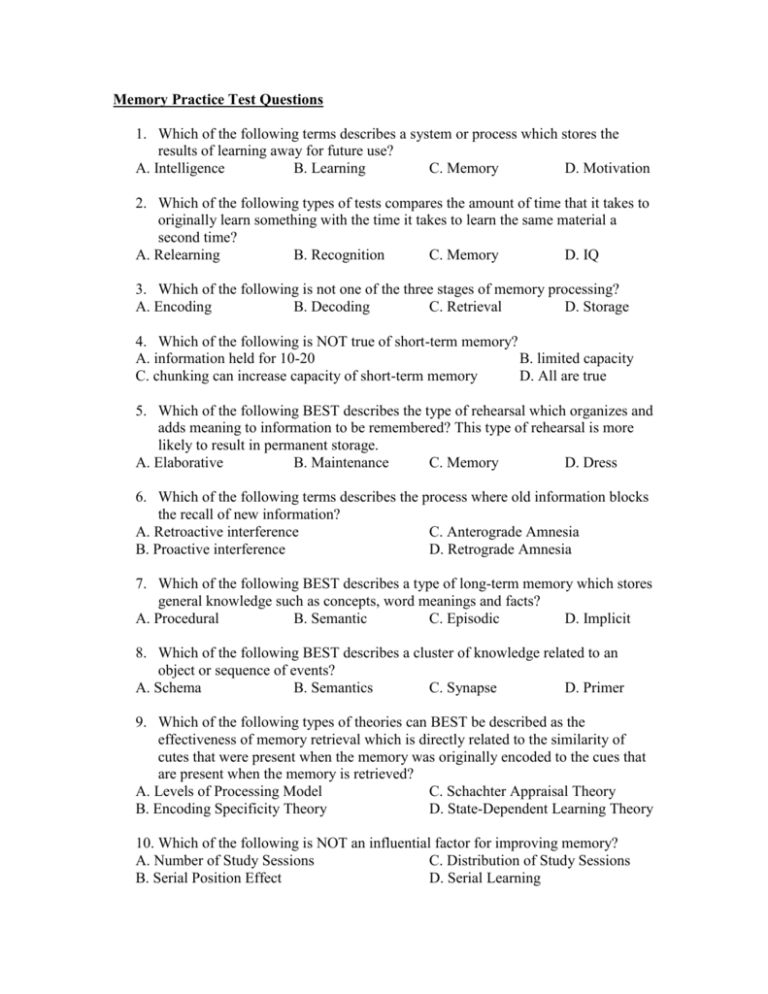Sensory memory is a mental representation of how environmental events look sound feel smell and taste. In this stage of memory the brain retains information in order to access it later.

Learning Strategies Pdf Download Learning Strategies Curriculum Lesson Plans Cognitive Psychology
Which of these details from the excerpt is an example of sensory language.

. Sensory memory remains for few more seconds such as for 1 or 2 seconds when the stimulus is selectively attended. Sensory memory has the larger capacity as it holds the exact image of the object or sensory experience but it remains for few 200 to 300 milli seconds. Sensory Memory.
Lasts forever unless the person experiences brain trauma or dementia D. Such as iconic echoic. Sensory memory is the shortest-term element of memory.
It is the ability to retain impressions of sensory information after the original stimuli have ended. Alcohol dulls concentration impairs coordination and causes ones thought process to be disorganized. In this stage of memory the brain converts sensory information into memory form.
Sensory memory is the shortest-term element of memory. There are two main parts of the sensory register. It selects only a few important pieces of information to store.
This stage of memory involves. Which best describes sensory memory. Sensory Memory Sensory memory is a very short-term memory store for information being processing by the sense organs.
Autobiographical memory is more accurate than other types of memory. Sensory memory is a short memory provided by the five senses. These senses take in most of the stimuli you are exposed to.
Then by rehearsal it remains for 30 seconds in short term memory. Autobiographical memory is just as accurate as other types of memory. Which of the following BEST describes the short-term effects that alcohol has on the nervous system.
Which of the following best encapsulates autobiographical memory. Asked Aug 12 2019 in Psychology by Judys. Sensory memory is the earliest stage of memory.
This structure thalamus connects the cortex with other brain regions in all directions. Sensory memory refers to very short-term memories about perceptions of the world through the five senses of sight hearing smell touch and taste. Sensory memory is a very brief memory that allows people to retain impressions of sensory information after the original stimulus has ceased.
It includes a long-term component useful for such activities as recognizing a color or a familiar voice. CONCEPT Neurotransmitters and Synapses 17 Which of the following describes the storage stage of memory. Working memory stores information on a relatively permanent basis although it may be difficult to retrieve.
Visual memory also called iconic memory and auditory memory also called echoic memory. Learn more about it what to expect and more. Asked Aug 28 2019 in Education by Kathryn.
It stores everything that is sensed in a relatively unaltered fashion for only an instant. Working memory avoids the use of cognitive resources of information. Sensory memory is ultra-short-term memory that lasts only milliseconds for most people following stimulus offset or onset.
Sensory memory is referred to as working memory. Which of the following best describes sensory memory. Meaningful information may remain for hours.
Sensory memory O short-term memory. The thalamus is a brain structure located between the midbrain and the cerebral cortex. Iconic memory is a form of sensory memory that stores visual short term impressions and sensations.
The different periods of ones life are remembered with equal ease. C Sensory memory permits us to keep information in an active state briefly so that we can do something with the information. For example the ability to look at something and.
It is the first store of the multi-store model of memory. Which of the following best describes association as a memory technique. B Sensory memory is the memory store in which information first has meaning.
Lasts only a fraction of a second and decays if not attended to. For example the ability to look at something and remember what it looked like with just a second of observation is an example of sensory memory. It is often thought of as the first stage of memory that involves registering a tremendous amount of information about the environment but only for a very brief period.
Which detail uses sensory words to describe Akela. Auditory memory stays for as long as a month. The words Creakes and Rattled allow the reader to visualize _____ Which of these choices is an.
Long-term memory o working memory. Which of the following best characterizes the duration of sensory memory. Alcohol affects ones movement speech and vision and causes ones breathing to speed up and become irregular.
During this stage sensory information from the environment is stored for a very brief period of time generally for no longer than a half-second for visual information and 3. What are 2 types of sensory memory. It acts as a kind of buffer for stimuli received through the five senses of sight hearing smell taste and touch which are retained accurately but very briefly.
A The precision of sensory memory is low due to its brief duration. Sensory memory O sensory memory. Sensory memory can be divided into subsystems called the sensory registers.
However most vivid details of sensory memory seem to fade quickly. Based on a long history of research this chapter examines defining. Iconic memory is the sensory memory related to visual memory and might also be called visual short term memory.
This stage of memory involves the interpretation of unconscious thoughts. The statement it relays most sensory signals to the cortex. It is the ability to retain impressions of sensory information after the original stimuli have ended.
Working memory permits us to keep information in an active state briefly. 7 Which of the following is TRUE of sensory memory. Which of the following best describes the Stage Model of Memory.
BEST describes a major role of the thalamus Option D. Limited to about 7 items and only lasts for 18-20 seconds. It stores information primarily in terms of its underlying meaning.

Memory Practice Test Questions


0 Comments